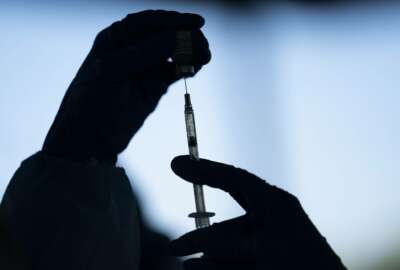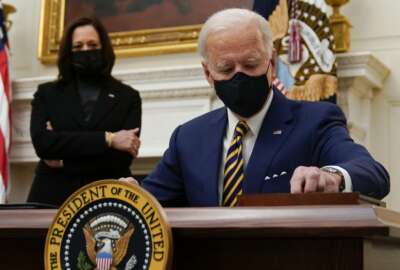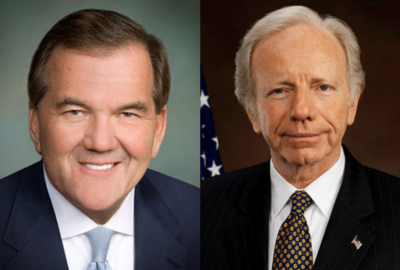
Pandemic shows U.S. needs to beef up biological defenses
The government seemed off guard when the COVID-19 pandemic first hit US shores. Now a bipartisan commission which warned of the need for strong biological defense...
Best listening experience is on Chrome, Firefox or Safari. Subscribe to Federal Drive’s daily audio interviews on Apple Podcasts or PodcastOne.
Plans for dealing with pandemics go back a ways, yet the government seemed a little off guard when the COVID-19 pandemic first hit US shores. Now a bipartisan commission which warned of the need for strong biological defense plans back in 2015, recommends what it calls an “Apollo” plan for dealing with the next one. Federal Drive with Tom Temin spoke with the co-chairmen of the Bipartisan Commission on Biodefense, former Sen. Joe Lieberman and former Homeland Security Secretary Tom Ridge, starting with the question, “Didn’t the George W. Bush administration develop a pandemic response plan?”
Interview transcript:
Tom Ridge: We’ve been studying bioterrorism for years, and at the end of every study it ends up on the shelf, gathers dust and nobody does a darn thing about it. And we committed ourselves not only do the study, but to generate enough support to come out with a very specific set of recommendations and then to work hard to see if Congress would adopt those recommendations. Unfortunately, they took one or two to heart, but there’s a much longer list to be accomplished based on the 2015 presentation we made to the political world. But more importantly, we’re not here to play the “we told you so” game, but we say this is a wake up call. And we got to take that seriously. We don’t want to go another step further – we need an Apollo program. We’re a resilient country, but we need to be an aspirational country, have to be bold. We got 400,000 Americans who have died in the past year because we ill prepared. We can’t eliminate infectious diseases – Mother Nature’s too tough, true adroit, too smart – but we can certainly eliminate the impact of a pandemic. And that’s why I’m proud to be associated with Sen. Lieberman and my bipartisan colleagues to extend the 2015 program into something bigger and bolder and more aspirational. And that’s the Apollo Program for Biodefense.
Tom Temin: What would the elements of that strategy be because earlier we talked about bioterrorism, this wasn’t a terrorism event. It was something that affected many countries equally, including countries that we would suspect of terrorism in other cases. But with respect to going forward, especially what the federal government’s role would be, Senator?
Joe Lieberman: Yeah, well, this is an important point. Two things: One is, this is a Bipartisan Commission on Biodefense, and there’s different kinds of bio attack we want our country to be prepared for. Frankly, when we started, I think Tom and I [were] thinking about bioterrorism because we had dealt with it in our previous work. As this has gone on, we don’t diminish the threat of bioterrorism. In fact some enemies seeing the impact of COVID-19 are probably more likely to invest – countries that we know have biological weapons programs like Russia, China, Iran, and we know that terrorist groups are trying to develop them as well. But honestly, the most devastating potential that we saw, as we learned is exactly what we’ve experienced in the last year, which is infectious disease pandemics. And here we are. So what we’re saying in this Apollo program, is we just weren’t ready this time and shame on us, if we don’t invest now to be ready for the next time. We actually have the science and technology, as we proved in the rapid development of the vaccines this time. And so we’re setting goals in this report, which we’re sending to President Biden, bipartisan leaders of Congress. Let’s start with this: 25 families of viruses that science has identified, we have the goal here to develop a vaccine for each of those families. It won’t be exactly what breaks out, but at least we’ll have it in the warehouse. And when the disease breaks out, we’ll run a genome test on it, we’ll find out what it is and we could rapidly develop the vaccine. Here’s a few things that may sound like science fiction, but we set them as a goal: Next time, we don’t want people waiting in lines or frantically searching on the internet for where they get a vaccine, we want to be ready to send a vaccine quickly to everybody’s house. And they’ll administer it themselves either in a nasal spray, or a pill. And we want to also send them the ability to test themselves quickly at home. I mean, this sounds as I say, like science fiction. But we actually have the science and technology to make it happen. What we need is leadership from the federal government. It’s just not going to happen if we let it go, it’s not going to happen in the private sector. The states can’t do it, it’s too big. The federal government has to take hold of this and fund it regularly. I mean, we spent about over $700 billion a year on national defense. More people have died as a result of COVID-19 than died in World War II. If we invest $10 billion a year, $20 billion on the outside for five or 10 years, we’re gonna be able to stop the next infectious disease from becoming a pandemic.
Tom Temin: And by the way, giving someone a shot. It’s not all that hard either. I’ve done it doesn’t take 10 years of med school to be able to do that. But I wanted to ask about the role of government versus industry because, frankly, in pandemic after disaster after you name it, private industry’s experience and skill in logistics and distribution and coordination of supplies really exceeds that of the federal government. So shouldn’t the government operate in partnership with industry that can really deliver, as we saw in Katrina, as we saw in so many other instances?
Tom Ridge: The question is well placed and as we look back to where recommendations in 2015, and how we take on the much bigger scale, much more aspirational Apollo program, you’ll note embedded is the kind of public-private partnership that is a absolute necessity in order for us to achieve these results. We start with obviously, that’s the source of the science and technology that we need. You’ve got some capabilities within the federal government that complement that. But the Apollo program, again, very much like the Apollo program that President Kennedy initiated, can only succeed with a kind of historic collaboration that led us to getting to the moon in less than 10 years. It’s an ambitious program. We can get there within 10 years, and the senator pointed out needle-free drugs and vaccines, point of contact testing – you have your own testing kit in your own home – building up the manufacturing capabilities, and coming up with a distribution plan. The warp speed capacity to build these vaccines to come up with the genome sequencing and to come up with these vaccines – we know we’ve got the science and technology, but we got to take it to a higher level, be far more aggressive, look at the 25 viral families, build out vaccines. As soon as we see a mutation, we can adapt. There’re plenty of things we can do. We need a 10-year runway, it’s a great aspiration, but we got the scale and the capability to do it. Question is do we have the will, and if we don’t have the will after 400,000 Americans, and it may be 600,000 by the time we’re done – and that would include all the wars we’ve ever fought, then shame on us.
Tom Temin: Your plan does mention detection and surveillance. And that seems to be the central requirement, because then you could kick off all of the distribution, the creation of vaccines and so forth, because you can’t really create vaccines in advance. Or can you? And what’s the incentive for the companies to go ahead and do that on a potential?
Joe Lieberman: So really important question. I mean, as we found after our first report in 2015, this is one of those areas where the pharmaceutical companies for just business reasons, are reluctant to invest a lot of money, because they don’t know that there’s going to be a pandemic or an infectious disease outbreak. And that’s where we need the federal government to partner with them as it did rapidly in the last year, which developed in this warp speed vaccine production, which is really miraculous. So the federal government has to be involved in a partnership with the private sector. And together, there’s enormous potential for what can be achieved and we’re confident – it takes leadership, it takes leadership from the top. But if we don’t lead, everybody’s going to suffer. Again, basic point that we have: Infectious diseases are inevitable. Pandemics are not inevitable. If we learn the lessons of the last year, and make sure we’re ready next time this happens.
Tom Temin: It seems like the government needs a rapid-response-type of mechanism, as opposed to say, making 10 million or 100 million vaccines and stockpiling them, because every time the government stockpiles, stuff goes bad. And then 10 years later, somebody realizes we have a stale stockpile of this or that. So the ramp up, and the coordination seemed to be the missing elements more so than the materials.
Joe Lieberman: So I’ll just say quickly, what we’re putting forward as goals here – 25 families of viruses that science has identified. Our goal is to develop a vaccine for one of those pathogens in each of those families. It may not be the one that breaks out sometime in the future. But we got that head start. As soon as it breaks out, you do the genomic testing of it, you find out exactly what its characteristics are, then you’ve got the basic vaccine and that family of viruses, which we can quickly adjust and start to mass produce it. And so now that we are focused on making sure that a lot of this stuff is manufactured in the US, which it wasn’t when COVID-19 broke out. We can’t again let ourselves be dependent on other countries which have their own people that they want to take care of.
Tom Temin: And who should be the lead agency, HHS, Homeland Security?
Joe Lieberman: The White House. It’s got to be somebody right there in the White House running this program.
Tom Temin: Former Sen. Joe Lieberman and former Homeland Security Secretary Tom Ridge. We’ll post this interview along with a link to their report at FederalNewsNetwork.com/FederalDrive. Subscribe to the Federal Drive at Apple Podcasts or wherever you get your shows.
Copyright © 2025 Federal News Network. All rights reserved. This website is not intended for users located within the European Economic Area.
Tom Temin is host of the Federal Drive and has been providing insight on federal technology and management issues for more than 30 years.
Follow @tteminWFED
Related Stories





